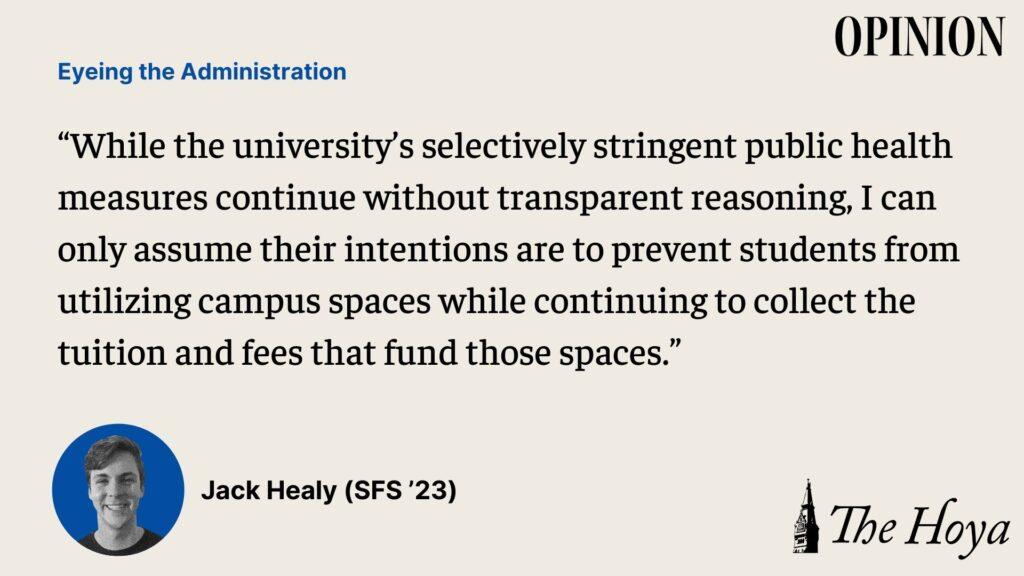It wouldn’t be another month of the new year at Georgetown without the smiley-faced signs in the Leavey Center warning students to comply with the no food or drink policy throughout the building. The signs are a warm reminder of the university’s continuation of strict public health measures through Feb. 11 that Provost Robert Groves announced in a Jan. 24 message.
Although we resumed classes in person this week, on-campus dining remains grab-and-go while communal eating areas remain almost nonexistent. Campus recreational facilities are now open with limited capacity, but student basketball courts stay closed and some club sports teams are still prohibited from holding practices. Lauinger Library sits barren, inhospitable to anyone who might prefer to drink water while studying. I am not sure when the Healey Family Student Center will ever fully reopen.
I have previously argued that Georgetown’s public health team needs to embrace the efficacy of vaccines in preventing severe disease, hospitalization and death instead of subjecting in-person instruction and campus life to the volatility of case numbers. To reiterate, I do not believe in the necessity of the public health measures I have discussed here and want to see campus as open as possible given the protection vaccination offers our community. If university administrators are set on continuing the same, arbitrary public health measures, however, there may be nothing we can do as students to change their minds.
I only ask that they be transparent regarding their priorities and motivations behind such “half-closures” of campus spaces. If university leaders insist on these restrictions—now until February 11th, or again in the event of future surges in cases—they must let us know why.
Unfortunately, the university has not made such candid admissions in the past, though University President John J. DeGioia (CAS ’79, GRD ’95) always remembers to thank students for their continued flexibility in his announcements. To admit to financial considerations behind their decisions might legitimize any calls for partial refunds on boarding expenses and student activity fees, which may be why university leaders decided to reopen Yates Field House earlier than originally intended, albeit with meager hours. However small those refunds might be, they add up. I imagine the university is not enthusiastic about such an idea after incurring financial losses in 2020, during earlier stages of the pandemic.
Given the lack of reasoning the administration has provided surrounding its selective choice of public health measures, I am left to assume these measures are meant to disincentivize students from using public spaces like Lau. Since students have their water bottles confiscated at the door, Lau 3 — unsurprisingly — looks as desolate during the week as it does on a standard Saturday night. All the while the administration avoids facing any blowback for failing to provide welcoming study spaces at all. Similarly, grab-and-go dining disincentivizes students from going to Leo J. O’Donovan Dining Hall if they have the means to cook in their apartments, yet the university offers no option for students with kitchens to temporarily opt out of the meal plan.
This suspect method of COVID-19 policymaking is not new. Last October, in response to a spike in cases, the university reduced the density of seating in Leo’s, which added difficulty to the process of finding a table and, once again, discouraged many students from venturing to the dining hall at all. Early this January, in a follow up to the announcement of remote learning, Chief Public Health Officer Ranit Mishori (MED ’02) and Jeanne Lord, interim vice president for student affairs and dean of students, sent an email outlining arrival testing, quarantining, isolation procedures and more. While the message did not explicitly discourage students from returning until Jan. 31, it read to me as if university leaders would prefer students stay away from campus until then. Stressing that students don’t have to return avoids the financial fallout that partial boarding refunds would entail if the campus was closed altogether.
Ideally, an honest administration would admit community transmission is more dependent on social gatherings and not the mask compliance of students eating and drinking in the library. While the university’s selectively stringent public health measures continue without transparent reasoning, I can only assume their intentions are to prevent students from utilizing campus spaces while continuing to collect the tuition and fees that fund those spaces.
If my request for increased transparency seems unreasonable, I would gladly invite President DeGioia or Dr. Mishori to join me for a meal in the tent on the Southwest Quad, an — ironically — enclosed space where I would be happy to hear more about their motivations.
Jack Healy is a junior in the School of Foreign Service. Eyeing the Administration is published every other week.















Katelyn Rickert • Feb 4, 2022 at 2:09 pm
Amen! Georgetown has refused transparency throughout the course of this pandemic and refuses to acknowledge how their decisions really impact student lives.